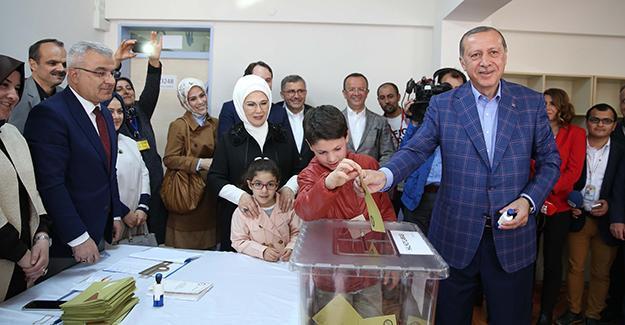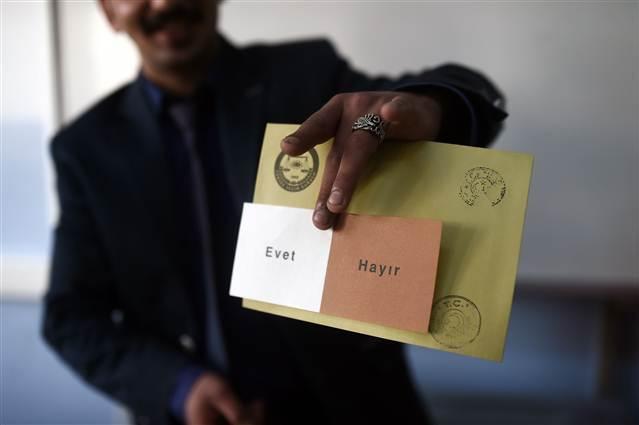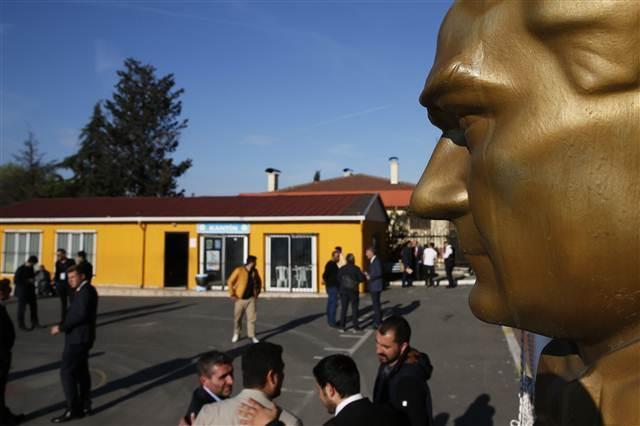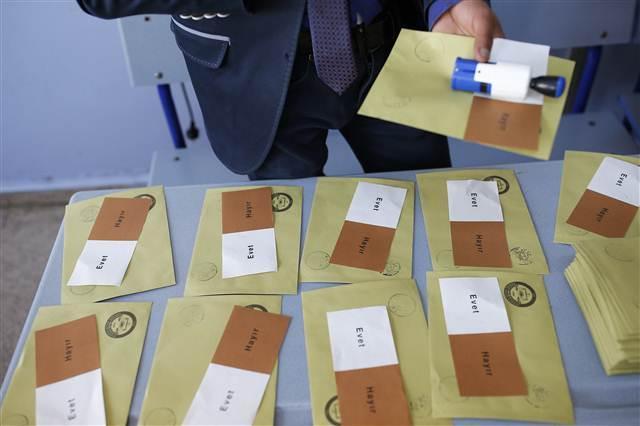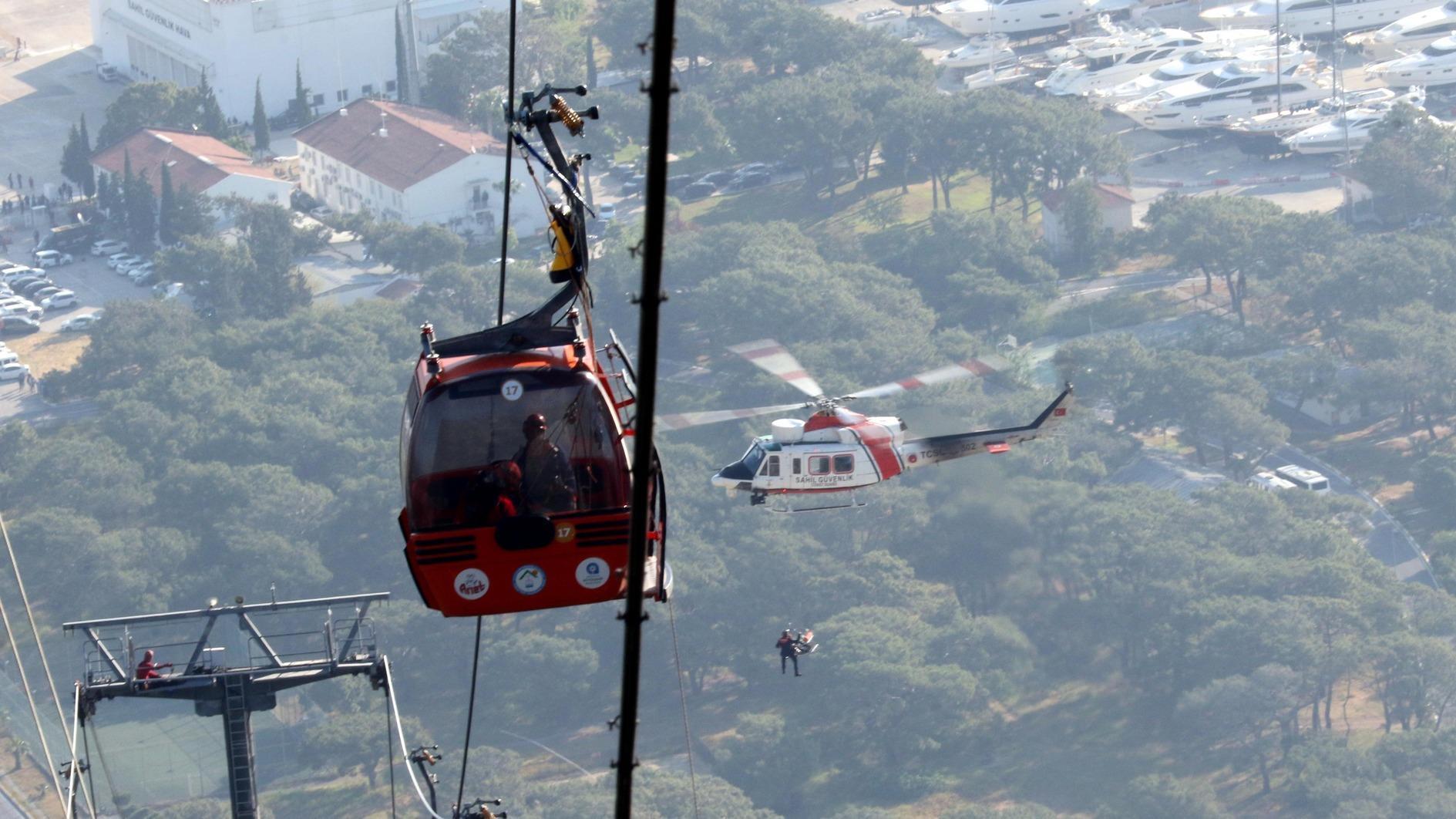Turkey approves presidential system in tight referendum
ISTANBUL
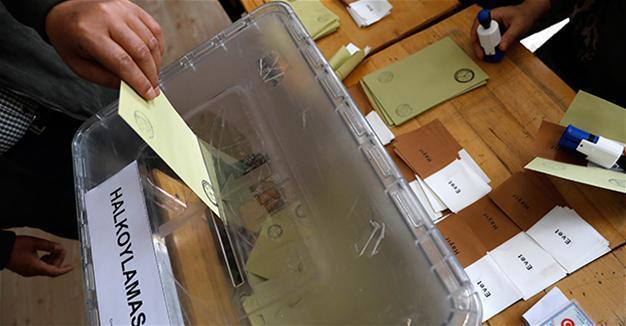
REUTERS photo
Some 51.3 percent of the more than 58 million Turkish voters said “yes” to the ruling Justice and Development Party’s (AKP) constitutional amendment package in a tight race to decide on whether to shift to an executive presidential system.The gap between the two votes stood at around 1.3 million according to midnight figures by the state-run Anadolu Agency. The turnout exceeded 84 percent.
The approval of the amendment package - which was backed by the Nationalist Movement Party (MHP) and opposed by the main opposition Republican People’s Party (CHP) and the Peoples’ Democratic Party (HDP), the third largest party in parliament - means an administrative shift will take place in 2019 if no early elections are held.
However, the ruling party is expected to call for President Recep Tayyip Erdoğan to return to lead the AKP, something that was officially forbidden in the former system due to the constitutional impartiality of the president.
The most debated change in the 18-article package was the granting of executive powers to the elected president, who can pick his cabinet ministers from outside parliament.
Accordingly, the parliamentary and presidential elections will be held on the same day every five years.
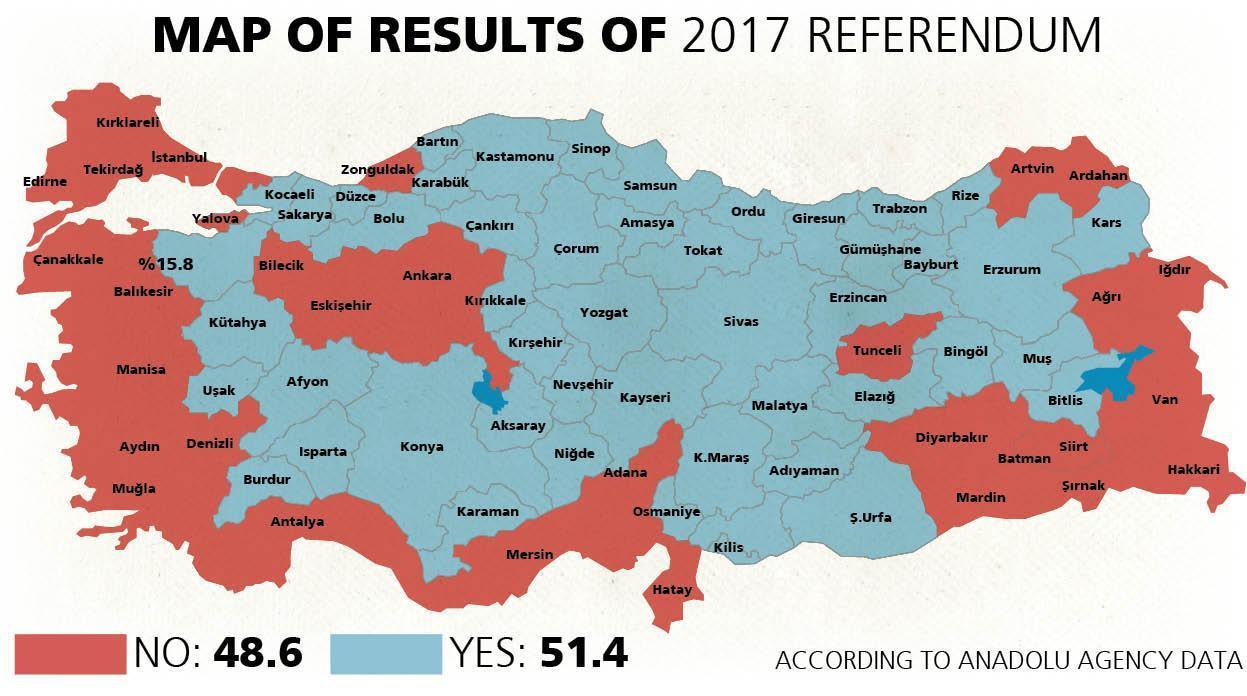
The president can appoint one or more vice presidents. The vice presidents will represent the president and will be able to use the authorities of the president in the event that the presidential post has become vacant for any reason. Vice presidents and ministers can be appealed to the Supreme Court by the same procedure as the president, and will benefit from the provisions of immunity about offences not related to their duties.
The “No” vote prevailed in Istanbul, Ankara and İzmir, the three largest cities in Turkey, with 51.3 percent, 51.1 percent and 68.8 percent of the vote respectively.
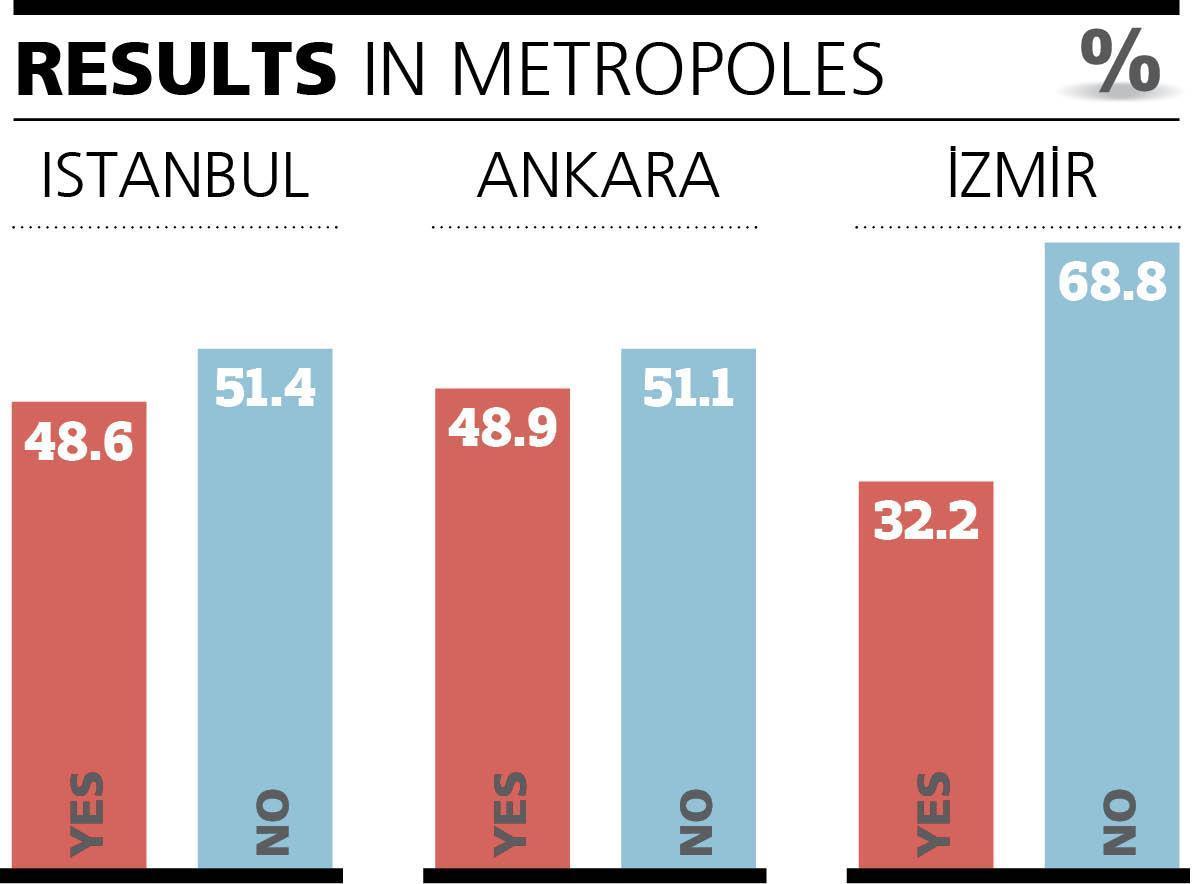
The “Yes” vote reflected the AKP’s dominance in the Black Sea region, while “No” votes dominated in most southeastern provinces, where the Kurdish-issue focused HDP is strong.
In votes cast overseas, the “Yes” camp won 59.27 percent while “No” votes won 40.73 percent. In Germany, “Yes” won 63.19 percent with 269,036 voters, while the “No” side won 36.81 percent with 157,467 voters.
Tensions ran high between the two NATO allies before the referendum, with Germany canceling several campaign rallies by Turkish ministers on German soil, drawing accusations from Turkey of “Nazi tactics.”
Tensions were also high point between the Netherlands and Turkey due to the former’s banning of campaign events by Turkish ministers. Family Affairs and Social Policies Minister Fatma Betül Sayan Kaya was prevented by Dutch police from reaching Turkey’s consulate in Rotterdam on March 11 after being told not to enter the Netherlands to conduct political campaigning for the referendum. Kaya was subsequently deported to Germany by Dutch police early on March 12. In the Netherlands the “Yes” side won 69.93 percent of the vote and 47,911 votes, while the “No” side stood at 30.07 percent in the Netherlands with 20,602 votes.
“No” votes prevailed in the United States with 83.26 percent and 3,362 votes, while 16,719 Turkish citizens voted “No” in the United States.
With the new amendments, elections can be renewed by both parliament and the president. If the parliament decides in favor of a re-election by 360 votes, parliamentary and presidential elections will be made at the same time.
In addition, all military courts are lifted apart from disciplinary ones.
The configuration of the Constitutional Court has also changed, with the number of members reduced to 15 from 17. Twelve members will be appointed by the president while three will be appointed by parliament.
The name of the Supreme Board of Judges and Elections will be changed into the Board of Judges and Elections. The number of members will be cut to 13 from 22. The minister of justice will be the head of the board, while the undersecretary of the Justice Ministry will be a regular member. Four members will be appointed by the president, three by parliament, three by the Supreme Court, and one by the Council of State.
The president will have the authority to issue budgets for approval by the parliament.
With the change, the number of MPs will be increased to 600 from the current 550. The minimum age to be elected will be reduced to 18 from 25.
Debate on a parliamentary inquiry can be initiated about any misconduct of the president regarding presidential duties by the votes of 301 lawmakers. However, the parliamentary inquiry can only be initiated with 360 votes. If the inquiry concludes that the president has committed misconduct, a minimum 400 votes will open the path to appeal to the Supreme Court. The procedure will also be applicable after the term of the president ends.
Turkey' Referendum: AS IT HAPPENED
11:06 p.m. - Main opposition Republican People’s Party (CHP) leader Kemal Kılıçdaroğlu said the referendum took place under unfair circumstances.
10:30 p.m. -Main opposition Republican People’s Party (CHP) leader Kemal Kılıçdaroğlu will deliver a speech at 10:45 p.m. from his party's headquarters.
10:17 p.m. - Turkish President Recep Tayyip Erdoğan said that nation showed its free will.
"Turkey has made a historic decision on its governance system," he said.
9:46 p.m. - Prime Minister Binali Yıldırım delivered a speech on the balcony of his party's headquarters after the referendum results, saying that the unofficial votes showed "yes" ahead of the referendum. "We are one nation, Turkey opening a new page in its democratic history" he said.
He said a new page was opening in the country’s democratic history, while adding that there are no losers in the referendum.
9:20 p.m. - Azerbaijani President Ilham Aliyev has congratulated President Recep Tayyip Erdoğan for the referendum results in a phone call.
8:50 p.m. - The Kurdish issue-focused Peoples’ Democratic Party (HDP) issued a statement on Twitter, saying they would oppose two thirds of the polls whether the results are “yes” or “no.” According to data gathered by them there was 3 to 4 percent manipulation, the party said in its statement.
8:41 p.m. - Nationalist Movement Party (MHP) leader called referendum results a very significant success.
8:23 p.m. - President Recep Tayyip Erdoğan congratulated the referendum results and spoke over the phone with Prime Minister Binali Yıldırım and opposition Nationalist Movement Party (MHP) leader Devlet Bahçeli, according to Presidential Office officials.
8:20 p.m. - CHP deputy leader Erdal Aksünger said the party would appeal 37 of the ballot boxes in terms of content.
7:50 p.m. - Prime Minister Binali Yıldırım will deliver a speech at 9:00 p.m., according to the PM’s office.
7:39 p.m. - Istanbul’s Taksim Square closed to traffic due to security measures, Doğan News Agency has reported.
7:36 p.m. - The ‘yes’ votes for the country’s key referendum on shifting the governance system to an executive presidency are ahead of the ‘no’ votes, according to initial results.
Percentage of ballot boxes opened: 95.0
YES: 51.7
NO: 48.63
7:30 p.m. - Fewer votes have been counted in Istanbul than are being reported by state-run Anadolu Agency, main opposition Republican People’s Party (CHP) deputy leader Erdal Aksünger has said, adding that the real number of opened ballot boxes was just 57 percent.
Anadolu said the “yes” side was at 51.0 percent while the “no” side was at “49.0” percent.
7:28 p.m. - Deputy Prime Minister Veysi Kaynak said that the results “are not what they expected.” “The ‘yes’ votes are lower than what we expected, but still they are ahead,” he said.
7:11 p.m. The ‘yes’ votes for the country’s key referendum on shifting the governance system to an executive presidency are ahead of the ‘no’ votes, according to initial results.
Percentage of ballot boxes opened: 90.0
YES: 52.4
NO: 47.6
6:50 p.m. - The ‘yes’ votes for the country’s key referendum on shifting the governance system to an executive presidency are ahead of the ‘no’ votes, according to initial results.
Percentage of ballot boxes opened: 80.9
YES: 53.6
NO: 46.4
6:35 p.m. - The ‘yes’ votes for the country’s key referendum on shifting the governance system to an executive presidency are ahead of the ‘no’ votes, according to initial results.
Percentage of ballot boxes opened: 70.9
YES: 54.8
NO: 45.2
6:25 p.m. - The ‘yes’ votes for the country’s key referendum on shifting the governance system to an executive presidency are ahead of the ‘no’ votes, according to initial results.
Percentage of ballot boxes opened: 61.4
YES: 56.0
NO: 44.0
6:15 p.m. - The ‘yes’ votes for the country’s key referendum on shifting the governance system to an executive presidency are ahead of the ‘no’ votes, according to initial results.
Percentage of ballot boxes opened: 51.1
YES: 57.5
NO: 42.5
6:05 p.m. - The ‘yes’ votes for the country’s key referendum on shifting the governance system to an executive presidency are ahead of the ‘no’ votes, according to initial results.
Percentage of ballot boxes opened: 40.2
YES: 59.4
NO: 40.6
6:01 p.m. - The Supreme Election Board (YSK) announced it lifted the gag order on media.
5:57 p.m. - The ‘yes’ votes for the country’s key referendum on shifting the governance system to an executive presidency are ahead of the ‘no’ votes, according to initial results.
Percentage of ballot boxes opened: 32
YES: 61.3
NO: 38.7
Voter Turnout: %84:05
5:50 p.m. - The ‘yes’ votes for the country’s key referendum on shifting the governance system to an executive presidency are ahead of the ‘no’ votes, according to initial results.
Percentage of ballot boxes opened: 25
YES: 63.2
NO: 36.8
Voter Turnout: %83.89
5:03 p.m. - The Supreme Election Board (YSK) announced it would accept unsealed ballot papers in the voting.
5:00 p.m. – Polls were closed at 5:00 p.m. across Turkey. The first results of the votes will be released after election silence is lifted.
4:00 p.m. - Polls were closed at 4 p.m. in the eastern and southeastern provinces of Adıyaman, Ağrı, Artvin, Bingöl, Bitlis, Diyarbakır, Elazığ, Erzincan, Erzurum, Gaziantep, Giresun, Gümüşhane, Hakkari, Kars, Malatya, Kahramanmaraş, Mardin, Muş, Ordu, Rize, Siirt, Sivas, Trabzon, Tunceli, Şanlıurfa, Van, Bayburt, Batman, Şırnak, Ardahan, Iğdır and Kilis.
3:40 p.m. - Supreme Election Board (YSK) head Sadi Güven said in a statement that seals featuring the word “yes” instead of “choice” would be counted as valid.
He also stated that ballot papers on which YSK seals were applied to the front instead of the back would also be deemed valid.
Earlier, “yes” seals had been distributed to voters in the Reyhanlı district of the southern province of Hatay before being collected and replaced with the original “choice” ones.
3:23 p.m. - EU Minister Ömer Çelik cast his vote in the southern province of Adana.
“Now the nation has the word and the decision. I expect a powerful result for the future of our country. God willing everything will be fine,” Çelik said.
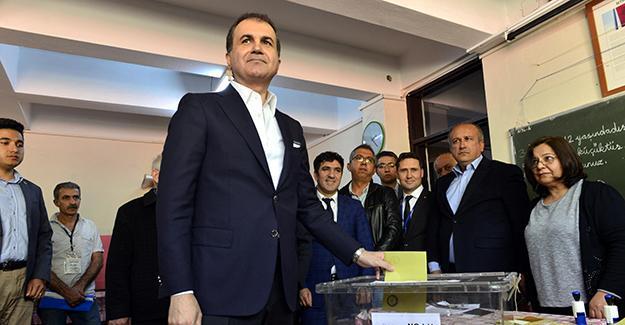
2:45 p.m. - Chief of General Staff Gen. Hulusi Akar cast his vote in a school in the Çankaya district of Ankara where authorities earlier searched for biological and chemical weapons.
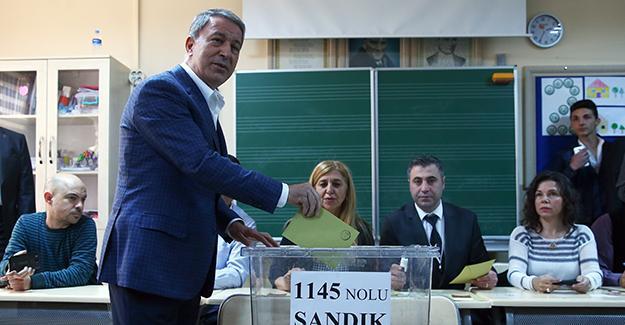
12:30 p.m. - Nationalist Movement Party (MHP) leader Devlet Bahçeli cast his vote in Ankara, calling it a significant turning point in the life of the nation.
“I’m happy that I carried out my civic duty. Turkish politics will head toward a new structuring regarding the future,” he told journalists.
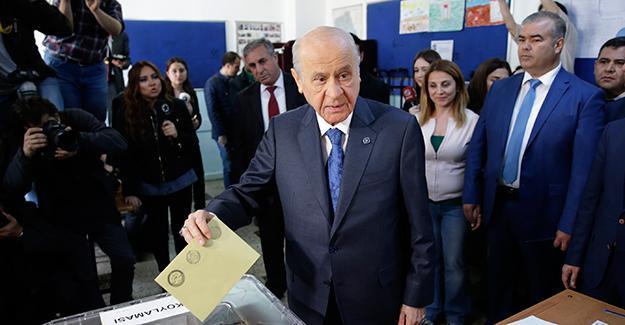
11:45 a.m. - President Recep Tayyip Erdoğan cast his vote in Istanbul, calling the referendum not an ordinary vote.
“This referendum is not an ordinary voting. We had plenty of elections aimed at the parliamentary system in the history of the Republic. We had some referendums, but this one is to decide whether to change the governance system. I believe that our people will decide for a faster development and even a leap forward. I believe that my people will walk toward the future by making their decision,” Erdoğan told journalists, adding that he will follow the results in Istanbul.
“It seems like there will be a serious participation,” he said.
